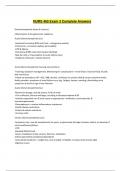NURS 460 Exam 3 Complete Answers
Glomerulonephritis (acute & chornic)
Inflammation of the glomerular capillaries
Acute Glomerulonephritis (s/s)
-Azotemia (increasing BUN and Creat—nitrogenous wastes)
-Proteinuria—increased capillary permeability
-HTN & Edema
-Hematuria & RBC casts (microscopic bleeding)
-May be mild, or may progress to acute kidney injury
-Headache, flank pain, malaise (severe)
Acute Glomerulonephritis (nursing interventions)
-Teaching: Symptom management, Monitoring for complications—renal failure, fluid overload, Fluid &
diet restrictions
-Follow-up evaluations: BP—ACE, ARB, diuretic; Urinalysis for protein; BUN & serum creatinine levels;
Notify provider: symptoms of renal failure occur (eg., fatigue, nausea, vomiting, diminishing urine
output) or at the first sign of any infection
Acute Glomerulonephritis (txs)
-Review the dosage, desired actions, & AE of meds
-If tx is effective, diuresis will begin, resulting in decreased edema & BP
-Includes supportive care & treat cause as appropriate—antibiotics, corticosteroids, &
immunosuppressants
-Plasmapheresis—remove inflammatory substances
-Fluid & dietary restrictions
-Protein & sodium restriction
-Increase carbs
Chronic Glomerulonephritis (s/s)
-Symptoms vary; may be asymptomatic for years, as glomerular damage increases, before s/s develop of
renal insufficiency/failure.
-HTN
-Elevated BUN & Creat
-Severe nosebleed, stroke, seizure, dizziness, headaches
-Edema (periorbital, peripheral dependent)
-Generalized symptoms—weight loss, lose strength, irritability, increase need urinate night
-Digestive issues
,-Malnourished
-Signs of fluid overload & heart failure
-Diminished deep tendon reflexes
-Urinary casts—proteins due to damaged kidneys
-Kidney damage continues
-Hyperkalemia
-Metabolic acidosis
-Anemia (decreased erythropoiesis)
-Hypoalbuminemia w/ edema
-Increased phosphorus
-Decreased calcium & low Vit D action
-Mental status changes
-Impaired nerve conduction
Chronic Glomerulonephritis (nursing interventions)
-Assess for changes in: Fluid & electrolyte status, cardiac & neurologic status
-Emotional support: Verbalize their concerns, Questions answered, Explore their options
-Teaching—think acute glomerulonephritis: Prescribed tx plan, Risks associated w/ noncompliance,
Scheduling for follow-up evaluations (BP, urinalysis for protein & casts, & lab studies of BUN & serum
creatinine levels), Long- term dialysis (about the procedure, how to care for the access site, dietary
restrictions, & other necessary lifestyle modifications)
Chronic Glomerulonephritis (txs)
-Reversing renal impairment & eliminating underlying cause
-Long term dialysis
-Fluid & dietary restrictions
Fluid Volume Excess (common fluid & electrolyte disturbances in renal disorders)
-S/S: Acute weight gain of at least 5%, Edema, Crackles, SOB, Decreased BUN, Decreased hematocrit,
Distended neck veins
-General management strategies: Fluid & sodium restriction, Diuretics, Dialysis
Sodium Deficit (common fluid & electrolyte disturbances in renal disorders)
-S/S: Nausea, Malaise, Lethargy, Headache, Abdominal cramps, Apprehension, Seizures
-General management strategies: Low-sodium diet, Fluid restriction, Normal saline or hypotonic saline
solutions during dialysis
Sodium Excess (common fluid & electrolyte disturbances in renal disorders)
-S/S: Dry, sticky mucous membranes; Thirst, Rough dry tongue, Fever, Restlessness, Weakness,
Disorientation
-General management strategies: Fluids, Diuretics, Dietary restriction
Potassium Excess (common fluid & electrolyte disturbances in renal disorders)
, -S/S: Diarrhea, Colic, Nausea, Irritability, Muscle weakness, ECG changes (tall, tented T waves is usually
the earliest sign on the ECG)
-General management strategies: Dietary restriction, Diuretics, IV glucose & insulin & sodium
bicarbonate, Cation exchange resin, Calcium gluconate dialysis
Calcium Deficit (common fluid & electrolyte disturbances in renal disorders)
-S/S: Abdominal & muscle cramps, Stridor, Hyperactive reflexes, Tetany, Positive Chvostek or Trousseau
sign, Tingling or fingers & around mouth, ECG changes
-General management strategies: Diet, Phosphate binders, Oral or parenteral calcium salt replacement
Bicarbonate deficit (common fluid & electrolyte disturbances in renal disorders)
-S/S: Headache, Confusion, Drowsiness, Increased respiratory rate & depth, N/V, Warm flushed skin
-General management strategies: Citric acid-sodium citrate, Bicarbonate replacement (rare), Dialysis
Protein Deficit (common fluid & electrolyte disturbances in renal disorders)
-S/S: Chronic weight loss, Emotional depression, Pallor, Fatigue, Soft flabby muscles
-General management strategies: Diet, Dietary supplements, TPN, Albumin
Magnesium Excess (common fluid & electrolyte disturbances in renal disorders)
-S/S: Facial flushing, N/V, Sensation of warmth, Drowsiness, Depresses deep tendon reflexes, Muscle
weakness, Respiratory depression, Cardiac arrest
-General management strategies: Calcium gluconate, Mechanical ventilation, Dialysis
Phosphorus Excess (common fluid & electrolyte disturbances in renal disorders)
-S/S: Tetany, Tingling of fingers & around the mouth, Muscle spasms, Soft tissue calcification
-General management strategies: Diet restriction, Phosphate binders
Prerenal (causes of AKI)
-Severe dehydration
-HF
-Decreased cardiac output
-Anaphylactic & septic shock
-Renal vein thrombosis
-Renal artery thrombosis
Intrarenal (causes of AKI)
-Acute tubular necrosis
-Toxic medications
-Lysed RBCs
-Myoglobin from necrotic or damaged muscle cells
-Hyperglycemic hyperosmolar nonketoic coma (HHNK)
Postrenal (causes of AKI)




